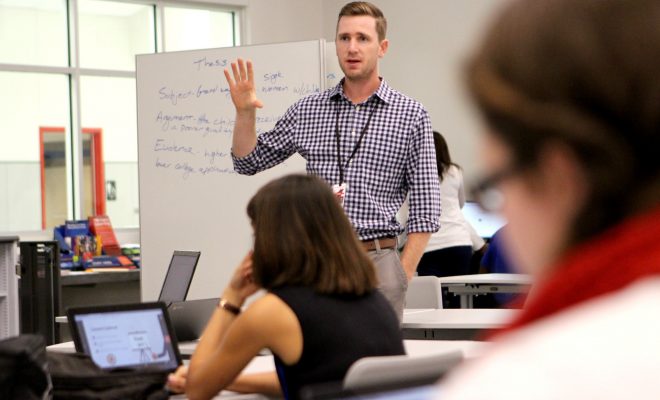How Did We Get Here? Part V: Public Education as a National Need

This is one of a multi-part series on the progression of education policies in the U.S. from its founding. Click here to see a list of all the posts in this series.
By Matthew Lynch
By the early 1900s the idea that every American child had the right to an education had gained mass adoption. Even students destined for a life in the mines, or on the railroads, deserved basic spelling, arithmetic and science lessons. Public schools were a place to absorb the common learning priorities that other students were also absorbing throughout the country. This view of public schools gave all children (at least the white ones) an equitable start in life, at least when it came to actual curriculum presented. School as a national pastime was established with the sole purpose of giving students base knowledge. From there, the students were free to carve out the lives they wanted, or follow in a predetermined path based on family or geographic limitations.
Just after the start of the 20th century, a new public education ideology began to emerge that hinted that schools should be utilized as more than spots to memorize facts. According to reformers like University of Chicago professor John Dewey, public schools needed to serve a greater good – for the individual and the country. Dewey was a figurehead of the Progressive Movement that insisted schools be socially conscious places where more than book learning took place.
While Dewey’s theories were widely known and discussed, they did not see much realization in the height of his popularity. Much like the public school districts of today, Dewey faced bureaucratic red tape at every turn and an unfriendly approach to change. In the eyes of educators, schools were established for learning what was written in a textbook, not for any other purposes, particularly ones that could easily be duplicated in homes.
Though slow to gain adoption in his own time, Dewey’s theories of public schools as socializers, and agents of change for the better, are certainly evident in school systems today. Consider public awareness campaigns, like First Lady Nancy Reagan’s “Just Say No” initiative that infiltrated schools in the 1980s, or the emphasis on Earth Day every April in public schools throughout the nation, or First Lady Michelle Obama’s current Let’s Move campaign that offers specific health awareness programs to schools. In the U.S., schools are the front lines for initiating change in behaviors as a nation and telling (more so than showing) students what is “right” or “wrong” in cultural terms.
Along with the base, common knowledge that accompanies the facts in textbooks, K-12 students in America are expected to know a set parameter of life truths before they graduate, or decide to drop out, like: smoking will kill you, drugs will kill you, obesity will kill you, taking care of the environment is not an option, stealing is bad, going to jail is bad, lying is bad, and cheating is bad too. Though not religious institutions, public schools have transformed in the past century from agents of factual information to ethics-infused entities. It is not enough for students to pass a test at the end of each grade and at the end of a K-12 career; to be true contributors to society, they must have moral compasses and understand the responsibilities of citizenship.
Of course some schools are better at this than others. In areas impacted by high poverty and crime rates, it is more difficult to graduate students who rise above their circumstances. Even middle- and upper-class school districts have their own bad apples. Still, these students are certainly aware of the right and wrong ways to live their lives, at least in theory, though they may not truly believe those truths themselves. Dewey would certainly be proud of the approach of public schools when it comes to socially conscious behaviors, if not disappointed by the outcomes of such efforts.
Though his theories were not particularly political, Dewey’s ethically-minded approach fed into the nation’s thirst for patriotism. Part of contributing to society was loving it and all its symbolism too. Consider the morning ritual of every public school in the nation since the early 1920s: reciting the Pledge of Allegiance. In his young adult fiction novel Nothing But the Truth, author Avi challenges patriotic rituals in public schools through the character of a young man who refuses to quietly listen as “The Star-Spangled Banner” plays in his classroom. The boy becomes a national celebrity, with both supporters and detractors. The supporters believe he was trying to sing along and should be celebrated for that fact. The detractors say he didn’t show enough respect for the song by refusing to stay silent as it played. On the final page of the book, the boy is asked to sing the National Anthem on a radio talk show and he admits he doesn’t know the words. The point then of the novel is that much of what students learn, at least when it comes to patriotism, is not based on an intrinsic loyalty but on one that is imposed.
The same can be said of the other ethics-based lessons that are part of American public schools today. The principles that constitute being a good citizen are just that: suggestions for living, not commands. Students are still guided by their own free will, though aware of the consequences. The idea, however, that schools should at least be presenting a socially conscious agenda started in the early-to-mid 20th century and still permeates K-12 public school classrooms today. Follow my series on the progress of the U.S. educational system to learn more about where we’ve been, and where we need to go, as collective educators.






